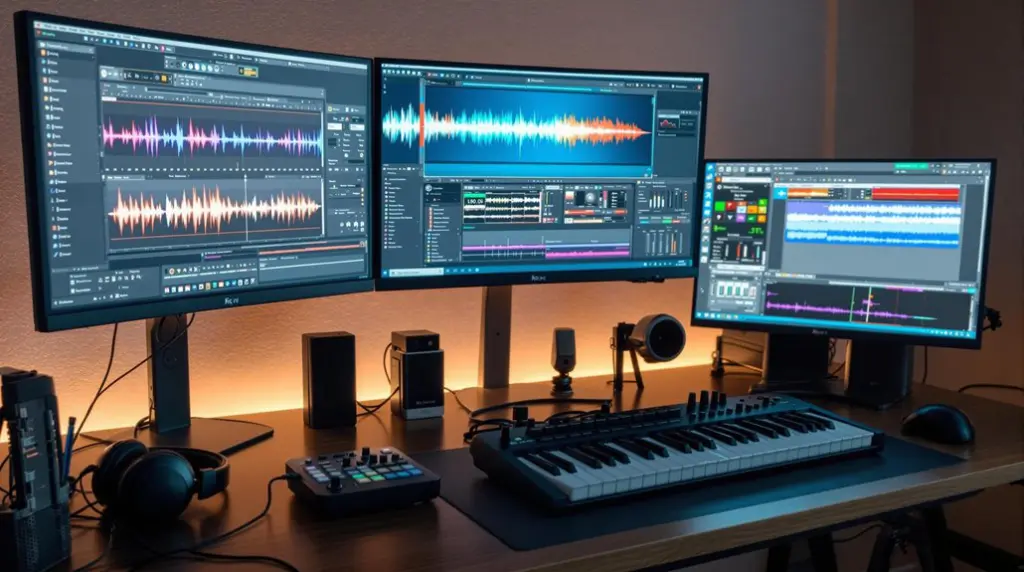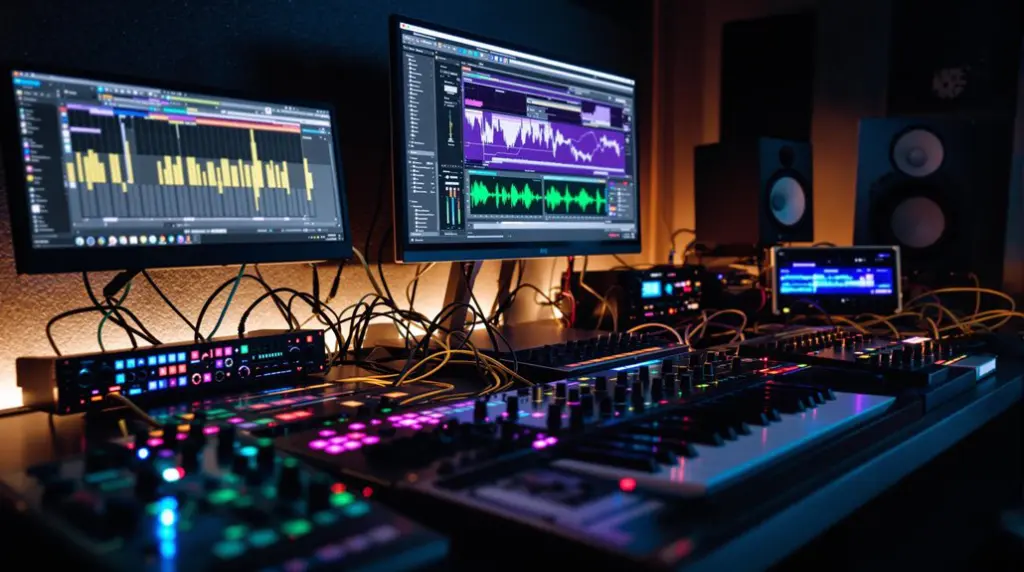Choosing the right audio interface is essential for achieving professional-grade podcast audio. The Focusrite Scarlett 2i2 impresses with low latency, while PreSonus AudioBox USB 96 offers durability and ease of use. Rode AI-1 is noted for its portability and high audio resolution. Zoom PodTrak P4 stands out with customizable sound pads and battery operation. Shure MVX2U provides broad device compatibility, and Behringer U-Phoria UMC22 is a budget-friendly option with MIDAS preamps. For top-tier sound, the Universal Audio Apollo Twin delivers with its advanced A/D and D/A converters and DSP processing. Explore further to understand the subtle differences enhancing your podcasting experience.
Key Takeaways
- Focusrite Scarlett 2i2 offers low latency for real-time monitoring and two high-quality preamps.
- PreSonus AudioBox USB 96 is affordable and includes durable construction with MIDI I/O.
- Rode AI-1 provides professional sound quality in a highly portable design with 24-bit/96kHz resolution.
- Zoom PodTrak P4 features customizable sound pads and multi-channel recording for flexibility.
- Shure MVX2U ensures crystal-clear sound with robust preamp and broad device compatibility.
Focusrite Scarlett 2i2
The Focusrite Scarlett 2i2 is a highly regarded audio interface featuring two XLR inputs and two line outputs, designed to deliver versatile and high-quality recording capabilities for podcasters and musicians. This interface is equipped with high-quality preamps and converters, ensuring crystal clear sound quality.
The preamps provide a clear and detailed capture of audio, making it an ideal choice for both vocal and instrumental recordings. The converters, on the other hand, support high-resolution audio, further enhancing the clarity and depth of the recordings.
One of the standout features of the Scarlett 2i2 is its low latency performance, which is essential for real-time monitoring during recording sessions. This guarantees that users can hear their inputs in real-time without any noticeable delay, facilitating a seamless recording experience.
Additionally, the Scarlett 2i2 boasts versatile compatibility, being fully operational with both Windows and Mac systems, thereby accommodating various recording setups.
Its solid build quality and compact design contribute to its reliable performance, making it a dependable choice for on-the-go recording needs. Overall, the Focusrite Scarlett 2i2 excels in providing high-quality sound and versatile recording capabilities, establishing itself as a reliable option for both podcasters and musicians.
PreSonus AudioBox USB 96
Often praised for its affordability and robust build, the PreSonus AudioBox USB 96 offers a practical solution for podcasters requiring multiple microphone setups with its two XLR inputs. Priced at an accessible $99, this interface guarantees that even budget-conscious podcasters can achieve professional-grade audio quality.
The inclusion of high-quality preamps ensures crystal clear sound, capturing the nuances of both voices and instruments with remarkable precision, making it an indispensable component of any serious recording setup.
Constructed with a durable steel chassis, the AudioBox USB 96 is designed for longevity and reliability, providing consistent performance across countless recording sessions. This makes it a dependable choice for podcasters who prioritize durability in their podcasting essentials.
Additionally, the device’s compact design and straightforward installation process offer a user-friendly experience, accommodating both novices and seasoned podcasters alike.
In terms of connectivity options, the PreSonus AudioBox USB 96 is equipped with MIDI I/O, providing additional versatility for those looking to integrate musical elements into their podcasts. This feature enhances the interface’s usefulness, allowing for a more dynamic and engaging production.
Rode AI-1
Designed for solo recordings with a minimalist approach, the Rode AI-1 is a compact USB audio interface offering high-quality 24-bit/96kHz audio resolution. Its streamlined design caters specifically to podcasters and solo musicians who require professional-grade sound without the complexity of larger interfaces.
Key AI 1 features include a single XLR input with phantom power, making it ideal for connecting professional microphones, and a headphone output for real-time monitoring, ensuring precise control over audio levels during recording sessions.
When comparing the AI 1 vs competitors, the Rode AI-1 stands out due to its simplicity and reliable performance. Here are the primary aspects that make it a remarkable choice:
- Audio Quality: The 24-bit/96kHz resolution provides crystal clear sound, rivaling more expensive interfaces.
- Connectivity Options: Featuring a single XLR input with phantom power and a headphone output, it covers essential recording needs for solo artists.
- Portability: Its compact design makes it exceptionally portable, perfect for on-the-go recordings.
- Affordability: Priced at approximately $125, it delivers professional sound quality at a budget-friendly rate.
Zoom PodTrak P4
The Zoom PodTrak P4 is distinguished by its compact and portable design, making it an essential tool for podcasters who require mobility.
Equipped with four XLR inputs, it accommodates multiple participants, thereby expanding the scope for diverse and dynamic podcasting sessions.
Additionally, the interface’s capacity to provide phantom power guarantees superior audio quality when using condenser microphones, solidifying its status as a professional-grade solution.
Compact and Portable Design
With its lightweight construction and compact form factor, the Zoom PodTrak P4 offers podcasters a highly portable audio interface solution. This device seamlessly integrates portable convenience with professional quality, making it an ideal choice for content creators who need to capture studio-level performance on the go. The PodTrak P4 achieves this through its meticulously designed features that cater to both novice and experienced podcasters.
Here are four key aspects that highlight its compact and portable design:
- Lightweight Build: Weighing just under 300 grams, the Zoom PodTrak P4 can be easily carried in a backpack or small bag, facilitating effortless transportation to various recording locations.
- Battery Operated: The device runs on two AA batteries or via USB power, providing flexibility and eliminating the need for constant access to electrical outlets, a critical feature for mobile recording.
- Ergonomic Layout: Its intuitive interface with clearly marked buttons and dials ensures ease of use, allowing podcasters to focus on content creation rather than technical adjustments.
- Customizable Sound Pads: Equipped with four programmable sound pads, users can instantly trigger intros, outros, and sound effects, enhancing the production value without requiring additional equipment.
The Zoom PodTrak P4 stands out for its on-the-go versatility and studio-level performance, making it an indispensable tool for podcasters seeking a portable yet highly functional audio interface.
Multiple Input Options
Featuring four XLR inputs, the Zoom PodTrak P4 accommodates multiple participants simultaneously, making it an ideal solution for podcasters engaging in roundtable discussions or interviews. This device’s multi-channel recording capability ensures that each participant’s voice is captured on a separate track, which is essential for post-production flexibility and achieving professional-grade audio quality. The individual gain control for each XLR input allows for precise audio level adjustments, guaranteeing that every voice is heard clearly and distinctly without distortion.
The PodTrak P4’s input flexibility extends beyond its four XLR inputs. It includes built-in effects such as EQ, compression, and noise reduction, which enhance audio quality directly at the source. This integration minimizes the need for extensive post-processing, enabling podcasters to produce polished episodes with greater efficiency.
Additionally, real-time monitoring and adjustments via the headphone jack allow for immediate audio feedback, essential for maintaining ideal recording conditions.
Shure MVX2U
Engineered for podcasters seeking portability and professional-grade audio, the Shure MVX2U is a compact USB interface featuring a single XLR input with 48V phantom power. This design guarantees seamless connection with professional microphones, delivering superior recording quality. The MVX2U’s robust preamp and digital conversion technology contribute to crystal-clear sound, making it an essential tool for podcasters aiming for high-fidelity audio.
The Shure MVX2U excels in connectivity options, offering broad compatibility with Windows, Mac, iOS, and Android devices. This versatility allows podcasters to record with their preferred hardware, whether in a studio or on the move. Its lightweight and durable build further enhance its appeal for mobile recording setups.
Key features of the Shure MVX2U include:
- Recording Quality: High-quality preamp and digital conversion for pristine audio.
- Connectivity Options: Broad compatibility with multiple operating systems and devices.
- Phantom Power: 48V phantom power supports professional condenser microphones.
- Portability: Compact and lightweight design ideal for on-the-go podcasters.
Priced around $130, the Shure MVX2U offers a cost-effective solution without compromising on performance, making it a top choice for podcasters who demand both quality and mobility in their audio interface.
Behringer U-Phoria UMC22
The Behringer U-Phoria UMC22 stands out as a budget-friendly option, priced around $50-60, making it accessible for beginner podcasters.
Its user-friendly interface features 2 XLR/TRS combo inputs with MIDAS preamps and 48V phantom power, guaranteeing clean and professional audio capture.
With a sampling rate of up to 48kHz and 24-bit resolution, this compact and rugged device offers high-quality recordings, ideal for those seeking reliability without a substantial investment.
Budget-Friendly Option
For podcasters and musicians seeking an affordable yet reliable audio interface, the Behringer U-Phoria UMC22 offers a compelling solution with its versatile input options and high-quality audio resolution. Priced around $60-70, this budget-friendly interface is equipped with a combo XLR/TRS input, providing flexibility for various recording techniques and soundproofing solutions. The 48V phantom power supports professional condenser microphones, essential for capturing nuanced sound in different room acoustics.
The UMC22’s 2×2 audio quality at 48 kHz resolution guarantees clear and precise recordings, making it a valuable tool for both novice and experienced users. Proper microphone placement is essential to optimizing the audio interface’s capabilities, and understanding room acoustics can further enhance sound quality. Compatible with popular recording software like Ableton Live and Pro Tools, the UMC22 integrates seamlessly into various digital audio workstations.
Key features of the Behringer U-Phoria UMC22 include:
- Versatile combo XLR/TRS input – suitable for diverse recording setups.
- 48V phantom power – supports high-quality condenser microphones.
- 2×2 audio resolution at 48 kHz – ensures clear and professional recordings.
- Compatibility with major recording software – provides flexibility and convenience for users.
This interface is an excellent entry-level option for those looking to produce high-quality audio without breaking the bank.
User-Friendly Interface
Podcast enthusiasts and musicians alike will appreciate the intuitive plug-and-play design of the Behringer U-Phoria UMC22, which simplifies the setup process and enhances user experience. This USB audio interface stands out for its quick setup and user-friendly controls, guaranteeing that even those new to podcasting can operate it with ease.
The UMC22’s seamless integration with various digital audio workstations (DAWs) means users can start recording almost immediately, minimizing downtime and maximizing productivity. Equipped with 48V phantom power, the UMC22 supports condenser microphones, enhancing sound quality and offering versatility for different recording needs.
The dedicated headphone output with level control facilitates real-time monitoring, allowing users to make immediate adjustments and ensure excellent audio levels during recording sessions. Constructed with a durable metal chassis, the UMC22 promises reliability and longevity, making it a robust choice for both beginners and seasoned podcasters.
Its budget-friendly nature does not compromise on quality, providing a cost-effective solution without sacrificing essential features. The hassle-free operation of the Behringer U-Phoria UMC22 makes it an exemplary choice for those seeking a dependable and user-friendly audio interface for their podcasting endeavors.
Universal Audio Apollo Twin
Boasting high-quality sound conversion and processing capabilities, Universal Audio Apollo Twin stands out as a premium audio interface tailored for professional audio recording and playback. This device is indispensable for both audio production and studio recording, offering an exceptional blend of versatility and performance.
The Apollo Twin is lauded for its Unison preamps and DSP processing, which deliver industry-leading sound quality. This makes it an excellent choice for podcasters and music producers who demand crystal clear audio. Its compact and portable design guarantees that it can seamlessly fit into both studio and mobile recording setups, providing flexibility without compromising on sound integrity.
Here are key features that highlight its superiority:
- High-Quality Sound Conversion: The Apollo Twin’s advanced A/D and D/A converters ensure pristine audio fidelity, vital for professional-grade recordings.
- Unison Preamps: These preamps emulate classic analog gear, offering a range of tonal options that enhance the richness and depth of recordings.
- DSP Processing: Onboard DSP allows real-time processing of UAD plugins and effects, minimizing latency and maximizing creative control.
- Versatile Connectivity: Multiple input and output options cater to various recording needs, making it a versatile tool for any recording scenario.
Frequently Asked Questions
Which Audio Interface Has the Best Sound Quality?
The Universal Audio Apollo x16 offers the best sound quality, excelling in preamp quality and minimizing latency issues. Its advanced A/D converters and Unison preamps guarantee superior audio fidelity, making it ideal for professional podcast production.
What Is the Best Audio Interface for Podcasting?
For podcasting, the Focusrite Scarlett 2i2 is highly recommended due to its balance of quality and affordability among budget options. It also mitigates compatibility issues, ensuring seamless integration with various recording setups and software.
Do Audio Interfaces Improve Sound Quality?
Yes, audio interfaces improve sound quality by reducing latency and enhancing preamp quality. They convert analog signals to digital with high fidelity, provide phantom power, and minimize background noise, ensuring professional-grade audio for podcasts.
How Do I Get Audio Quality for My Podcast?
To achieve superior audio quality for your podcast, prioritize microphone selection tailored to your recording needs and implement soundproofing techniques to minimize external noise, ensuring a clean, professional-grade audio environment for peak podcast production.
Conclusion
In summary, the selection of an appropriate audio interface is essential for achieving superior podcast sound quality.
The devices examined, including the Focusrite Scarlett 2i2, PreSonus AudioBox USB 96, Rode AI-1, Zoom PodTrak P4, Shure MVX2U, Behringer U-Phoria UMC22, and Universal Audio Apollo Twin, offer distinct advantages in terms of audio fidelity, connectivity, and user functionality.
Each interface presents unique features that cater to diverse recording needs, ensuring that podcasters can obtain crystal clear sound tailored to their specific requirements.




